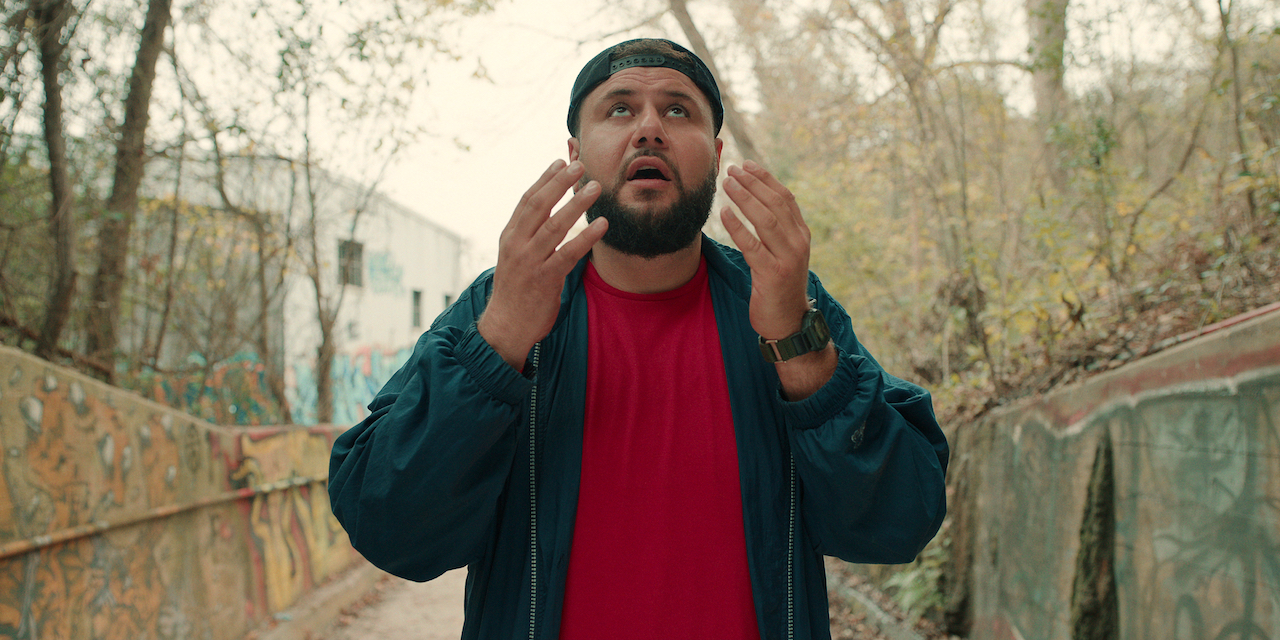“Most people don’t know stand up is an indigenous art form to the states,” said Mohammed Amer. “It’s jazz, hip hop, and stand up comedy, as far as I know, which are the three indigenous art forms of the States. I saw stand up live for the first time when I was ten years old and that was a moment of complete clarity for me. What I was destined to do.”
Mo Amer said he didn’t understand how profound that moment was until years later. “That has truly helped me filter so much pain in my life. To be expressive in a room full of strangers, to have my own expression, my own freedom of thought, whether it’s a story or observation, it created a balance in my life.”
As an actor, Mo played Karim in the latest Black Adam film and has also appeared on Ramy and Crashing. These days, he’s best known for stand up work, such as Mo Amer: The Vagabond and Mo Amer: Mohammed in Texas. But he’s also starring in the TV series he wrote for himself, Mo, for Netflix.

Mo (Mo Amer) and Maria (Teresa Ruiz) Photo courtesy of Netflix
“I had to educate myself, learn the craft, and I fell in love with it. Then I saw the landscape of what Hollywood was at the time and knew I was ahead of myself. From the future. The only Mohammad from the self, doing stand-up pre-9/11, so my reaction from the audience was very good but also very curious.”
Banking Material
Early mentors told him it would take twenty years to become an “overnight success.” Mo said, “That was spot on, at least how I wanted to do it. To craft something from scratch and also be revolutionary in it, where it’s different, unique, out of the box and can make an impact where people start copying you.”
“For years, my mentor Danny Martinez, set it up for me. I really paid attention and listened to him.” He said, ‘Don’t waste my time. If you listen, I’m going to give you the whole game plan. If you listen, you’re going to do very well.” Danny’s instructions were, “Whatever you have, you may not use it creatively now, but think about it as a bank. Eventually, you’re going to withdraw from this savings account.’ That’s a clear result in my series.”
The original opening of the series Mo, which has been moved to Episode 7, was a flashback scene over top of the Elvis song, “That’s All Right.” Mo said, “I wrote that scene in 2014, then kept building on it. Whenever the moment was right, I would add to it, but I just keep putting stuff in the bank.”

Aisha (Nene Nwoko), Mo (Mo Amer) and Maysoon (Zein Khleif) Photo courtesy of Netflix
Mo joked, “With Hollywood where it is, I mean, how many times are you going to tell a vampire story, ya know? I find it to be really important to constantly be different, then hone in on those stories. Arabic, is an ancient language, and we’re known for poetry and storytelling, so it’s in my blood and what I truly love the most.”
Layers of Complexity
Similar to his friend Ramy Yousef (read our interview with Ramy here), Mo said anyone with a new perspective has to educate while they perform. “By the sheer fact of being who I am, it’s a teaching moment. It’s not necessarily my intention, to be educational, but it’s where I come from.”
“Ramy and I are very different. That’s my boy, but he’s born in Jersey. I was born overseas and came here. That’s a different upbringing and experience in America. That’s why he and I love working together. He totally saw how unique my experience has been in America. Sometimes you feel like there’s a teachable moment, but I try to get away from it, because it can stunt creativity. It’s all about what the story is, and when you figure that out, you can plan the education, the drama, and the comedy.”
Mo said it’s more important to start with character and story first. “Once we figure all that out, we can layer in the complexities. Within those complexities, then you have the educational moments by nature, by subject matter, by just my background. Of course, there’s a massive gap in understanding Islam, honestly since the 40s — how Arabs have been depicted in cinema. It’s really bad.”
“It’s tough to take those topics on because they require so much finesse and nuance. It’s very difficult for me, to focus on Islam. I have no problem with culturally nuanced things about like seeing our food become mainstream while having so much discrimination. Like people talking shit about Arabs while dipping their food in ‘chocolate’ hummus. Shut the fuck up,” he laughed. “But that’s where the comedy comes from.”
He concluded, “When you have a main character who happens to be Muslim, those topics are going to come in easily, without forcing the issue.”
Pushing Forward
Pursuing the “twenty year success overnight” mantra has thousands of ups and downs. To be relentless about his career, Mo said he had to believe in himself completely. “Without a shadow of a doubt, I knew I was going to make it. Yes, it was tough. Tough is an understatement. It was brutal. That creeps in your mind. The devil whispers. Your own demons creep in, but my mentor would say, ‘The only time you’re not going to make it is when you quit.’”
“It wasn’t a shortage of talent,” he continued about his unwavering mindset. “It wasn’t like I was going up there and bombing for twenty years. I was killing it, people were having a great time, people were attracted to what I was doing… but I knew the industry didn’t get it.”

Mo (Mo Amer), Nick (Tobe Nwigwe) and Hameed (Moayad Alnefaie) Photo by Rebecca Brenneman /Netflix
Mo said he would “blast the room” and people would say he should “book Letterman” but then he would get overlooked again and again. “It would be the same old shit. Another everybody-sounds-like-Mitch-Hedberg comedian that was getting picked up. That was my life. Obviously, I was very different, but everybody was copying the same thing.”
“Everyone was attempting to do the same thing and to this day it happens. Hollywood just needed to catch up. These stories are different, but they’re also universal to everyone. You have to be patient and it’s frustrating and it’s easy to quit, but with stand up, you can earn a living doing what you love and maintaining your integrity.”
Mo said there were countless times he could have sold out and taken a role “as a terrorist” or “being the same old bullshit.” He said, “To me, I mean, I would play a terrorist, but I want to write it. I can think of a great idea to do that, like a Mel Brooks style, but I don’t want to do the same bullshit. It’s boring, overused and racist in some cases. There’s nothing significant. I want to use my creativity, which is why it’s so special to do a show like Mo.”
Writing Mo
Mo said it was special to do a show like Mo for a number of reasons. “To tell a story like that and put not only my experience as an immigrant and refugee in America, but to showcase Houston. There had never been a narrative series set in Houston and now Travis Scott is doing a documentary about DJ Screw. It’s a beautiful thing.”
The series, created by Mo and Ramy, is described as follows: “Mo Najjar who straddles the line between two cultures, three languages and ‘a ton of bullshit.’ The fictional Mo is a Palestinian refugee living one step away from asylum on the path to U.S. citizenship.”
“I never thought about not wanting to do this shit anymore. It was more about, when are they going to catch up?” Mo said he got to practice these stories on stage where the audience provides “immediate feedback,” be that a full joke or just a premise.
“That’s an instant barometer. But then you will get a note from someone else, on the script, who doesn’t get it. It’s sort of like, ‘Well, yeah, you have to see it.’ You have to be really firm in your beliefs and know it kills on stage. That’s the advantage I have in stand up. You can tweak it based on that experience.”
That said, it’s all about the execution, not just the idea itself. “Even some of your closest collaborators won’t get it until they see it. It has to be on tape. You have to have that footage to be able to show them. Chop it together. Add music. Put it to the pacing that you imagined it. Nobody gets it until you do it. But you have to be firm in your belief and hopefully, you’re not being stubborn and wrong.”
To find this middle ground, Mo said it’s important to be open to notes and open to collaboration, but then choose your battles accordingly. “Sometimes, the notes aren’t about being wrong or right, but maybe you haven’t fully executed what you envisioned yet.”
Being Different
After turning down dozens of offers over the years to play character tropes, Mo found something different in role of Karim for Black Adam. “It was very different. Guy named Karim who was dedicated, got his family, loved his job, this sweet innocent personality, just committed and protective. Dedicated to family and trying to free his country — the polar opposite of scripts I had been getting years earlier.”
For anyone trying to break into the industry, Mo would tell you to be dedicated. “It’s important to be dedicated to your craft. You can’t half-ass it. Yes, you’re going to have to be broke, living in a car maybe, swallowing your pride a thousand times, sleep in airports. It’s going to suck,” he said. “It’s going to suck,” he repeated.
“It’s so incredibly painful to do something that is so worthwhile, but when you get there, it’s so sweet. It’s the best,” he reflected back. “So much pain went into it, but then you get to a level where you can enjoy yourself, share it with friends from childhood, and in the end, that’s what I’ve always wanted. To share these timeless and timely stories with the world.”
This interview has been condensed. Listen to the full audio version here.

